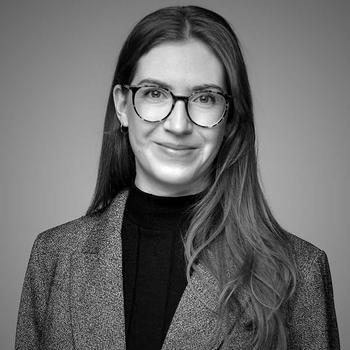Michelle Latta
Michelle Latta studied Art History (MA) at the Freie Universität Berlin and the University of Toronto, Canada. As a doctoral research fellow and member of the research training group “Normativity, Critique, Change”, she examines decolonial practices of Indigenous contemporary artists in present-day Canada. Her research is based on her master’s thesis “‘Truer Than Your Truth’ – Kent Monkman as a decolonial historian”. She completed her bachelor’s degree in science of art and history at the University of Duisburg-Essen with the thesis “Between Art, Fashion and Activism: The Vogue Project ‘Wir machen das’ by Katharina Grosse – in Comparison with Rosemarie Trockel, Cindy Sherman and Vanessa Beecroft”.
During her studies, she held several positions at the Institute for Art and Science of Art at the University of Duisburg-Essen: She was a research assistant in the research project “digIcon. Digital Image Literacy in Teaching Art and Visual Culture”, tutor on the topic “History and Future of the (Art) Museum” and assistant to the Chair of Modern and Contemporary Art History. She also worked as an intern at the Museum Kunstpalast Düsseldorf and the Museum Folkwang Essen, where she developed concepts for the anniversary exhibition “Renoir, Monet, Gauguin. Images of a Floating World” (cooperation between the Museum Folkwang and the National Museum of Western Art, Tokyo).
At the Center for University Quality Development (ZHQE) at the University of Duisburg-Essen, she also worked on university innovation processes.
Dimensions of a Decolonial Indigenization of the Normative in the Works of Contemporary Indigenous Artists in present-day Canada (working title)
My research deals with the decolonial transformation of social, art historical, historical, political, legal, gender, and sexual norms in the works of selected contemporary Indigenous artists in present-day Canada. By means of a comparative study, the following question will be explored: How do their decolonial practices initiate transformative processes that oscillate between the poles of an Indigenous (re)order of the normative on the one hand and an Indigenous reconceptualization of norms on the other? The aim of the research is to establish that these artists intervene as decolonial actors in the past, present and future through various strategies of active and critical reappropriations of identity and knowledge generation.
Thus, on the one hand, my research will show that artists such as Kent Monkman, Rebecca Belmore, Sonny Assu, and Jim Logan invasively inscribe Indigenous orders into the ‘Western’ normative structure by infiltrating ‘Western’ forms of representation and narratives. They question ‘Western’ norms and adapt them to Indigenous perspectives in order to revive and empower Indigenous standards. In this way, these artists are expediting the creation of spaces of possible Indigenous futures.
On the other hand, my research will show that artists such as Marianne Nicolson, Catherine Blackburn, Lisa Myers, and Lindsay Katsitsakatste Delaronde subversively interrupt or overwrite ‘Western’ concepts of norms. They detach themselves from a ‘Western’ aesthetic and instead explore possibilities of representation and negotiation of Indigenous experiences that move outside ‘Western’ orders. Hereby, they develop new understandings of norms that do justice to Indigenous epistemologies and thus enable the exploration of their own Indigenous identity.
The findings of my research are intended to contribute to the increasingly important decolonial discourse in art history, which – particularly in German-speaking Europe – still has a research gap in relation to decolonial theory and Indigenous contemporary art. Yet, as my research will argue, it is precisely art that drives decolonial concepts and the debate about their dimensions. Furthermore, it is important to me that my research itself critiques the norm: I am not only concerned with works that question the European or ‘Western’ canon, but also want to use my work to break open the theory and practice of Eurocentric art history. In doing so, I also have my role as a ‘white’ European researching and writing about Indigenous art in mind.
Research Interests:
- Decoloniality
- Critical Indigenous Studies & Critical Race Studies
- Transcultural Studies
- Queer & Feminist Theories
- Visual Culture
- Fashion Studies (the interweaving of art and fashion)
Essays
Karl Ernst Osthaus – From Commercial Apprentice to Art Collector and Museum Founder, in: Museum Folkwang Essen (ed.): Renoir, Monet, Gauguin. Images of a Floating World. The Collections of Kojiro Matsukata and Karl Ernst Osthaus (exhibition catalog). Berlin: Hatje Cantz Verlag, 2022, pp. 340-349.
Lectures
“The Artist is Present” by Marina Abramović. Looking into the eyes – a borderline experience, academic lecture as part of the 97th Art History Student Congress, Berlin 2019.





